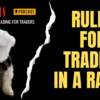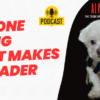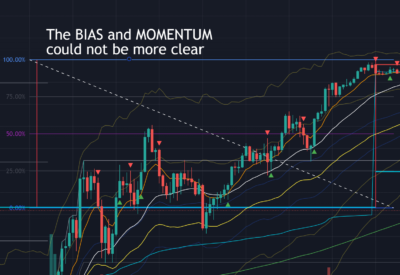I’ve created two questions that can reveal if someone has what it takes to become an elite trader.
If you care about the questions and don’t want any background, scroll down to the Question Headlines below.
Trading is my passion. It was one of the things I was born to do, although I discovered this late in my life. I could argue everything I’ve done thus far has allowed me even to have a chance at becoming an elite trader, but that’s to make me feel better.
So here’s the path I took… I think I can be a trader…
Fail, fail, fail, blown account.
Fail, fail, fail, blown account.
Fail, success, success, success…
Success, success, one bad day, blown account
Fail, success, fail, success, success, success, bad day but recovered.
Since that day, I have had more success than failure. Since that day, I’ve been able to correct negative trading habits quickly. Slowly trading became something I was good at. I still had a few challenges to overcome and always will.
From Edge to YouTube & Training
I soon realized I had an edge and began sharing it on YouTube. After a bit of time and requests, I created training. I was going to give it away for free, but I’ve learned throughout my life that people do not value free.
They say they do, and they think they do, but without some level of commitment, no one follows through. The best form of commitment I can get from someone I don’t know is monetary.
Why should I care if someone is committed?
My purpose for creating trading has always been thus:
- Become a much better trader, validate my trade system, and accelerate my trading skills
- Create Elite Traders who adopt my trade system and make it their own
The only way “students” will create a meaningful promise and commitment is first monetarily.
I’d like to share this with you because, in addition to my training from time to time, I’ve taken on a one-on-one student. I’ve never advertised this. I wait for traders in my membership to ask.
For the first few students, I had to learn quickly how to create consistent breakthroughs. I also had to learn how to get to the root of their deepest psychological challenges.
Early on, I assessed what criteria I should have before I took on a student.
It had to be something that allowed me to assess and understand the person before me quickly.
These are the two best questions where the answers reveal if someone has what it takes to become an elite trader.
Question 1 – Control of Oneself
The first question:
Share with me the times you have learned from your own mistakes.
If someone cannot provide one example, it doesn’t mean they can’t be an elite trader. It might be they don’t know how to express introspection.
If, after a bit of prompting, they can’t come up with at least three examples from their own life, then successful and repeatable trading might be out of their reach.
If they can only come up with a few examples but are weak and really didn’t involve any sacrifice, change in habits, or hard decisions and actions, then trading might not be a fit for them.
The correct answer is that they have a series of examples and have yet to repeat the mistakes. Less helpful but still acceptable is they’ve made substantial progress, but each slip-up mistake has less and less impact.
It does matter to some extent the impact of the mistakes. For instance, if someone says…
“I used to be terrible at cooking eggs, then one week I watched tons of YouTube videos, read articles and everyday I tried a new methods. Now I rarely have a day where I don’t marvel in the near perfect eggs I can cook.”
This is good. It shows they had a goal. They figured out a process to attain a goal. They stuck with it to figure it out and achieve the goal. Finally, they are still in awe of their ability.
Question 2 – Lessons of Others
The second question:
Share with me the times you have learned from the mistakes of others.
The same concepts from the first question are important here, except we are now trying to figure out the ability of someone to look outside of themselves.
Have you seen the movie Groundhog Day?
If you remember, there is a scene where our hero Phil Connors steps into a puddle. This happens right after he is cornered by the extraordinaire insurance salesman Ned “Needlenose” Ryerson, who has one of the most slap-worthy lines in cinema history:
Whoa-ho-ho! Watch out for that first step! It’s a doozy!
Like Phil in the movie, most will learn after the first few times not to step in that puddle.
Now imagine you are the down-on-his-luck homeless guy that Phil recoils from. The fantastic work of foreshadowing is one of the catalysts that make Phil become a better version of himself. Or does he? One of the great lessons of Groundhog Day.
Imagine you are also living this same day and have watched this scene play out time and time again. Will you step in that hole and puddle?
No, of course not, you say. This is obvious. Now imagine that puddle is never fixed. Will you step into it next week? Next month? Or will a trigger go off in your mind every time you walk that sidewalk that you should be mindful of the hole?
Have you observed a mistake by someone else that you’ve been able to internalize?
As I mentioned above, time plays a role in this. Most of us can evade recent lessons of mistakes we’ve observed. As time passes, we find it challenging to learn past lessons.
That’s why reading history alone isn’t enough. Reading history with proper context is what matters. The often credited but not confirmed Mark Twain aphorism, “history doesn’t repeat, but it often rhymes,” is true. Learning the lessons of history and how they apply to the present day is a form of wisdom.
It’s the same with mistakes you observe in others. You often won’t repeat them, but they will feel inspired. The goal is to take these lessons and learn to make them your own and overcome them.
What If You Can’t List Any?
That’s the first thing to work on. I’m no psychologist but if you continue to make mistake after mistake looking for trading to become your profession or a path to wealth is the least of your concerns.
Learn first how not to burn yourself when you walk by a hot stove. Then take the difficult take of becoming an elite trader.









